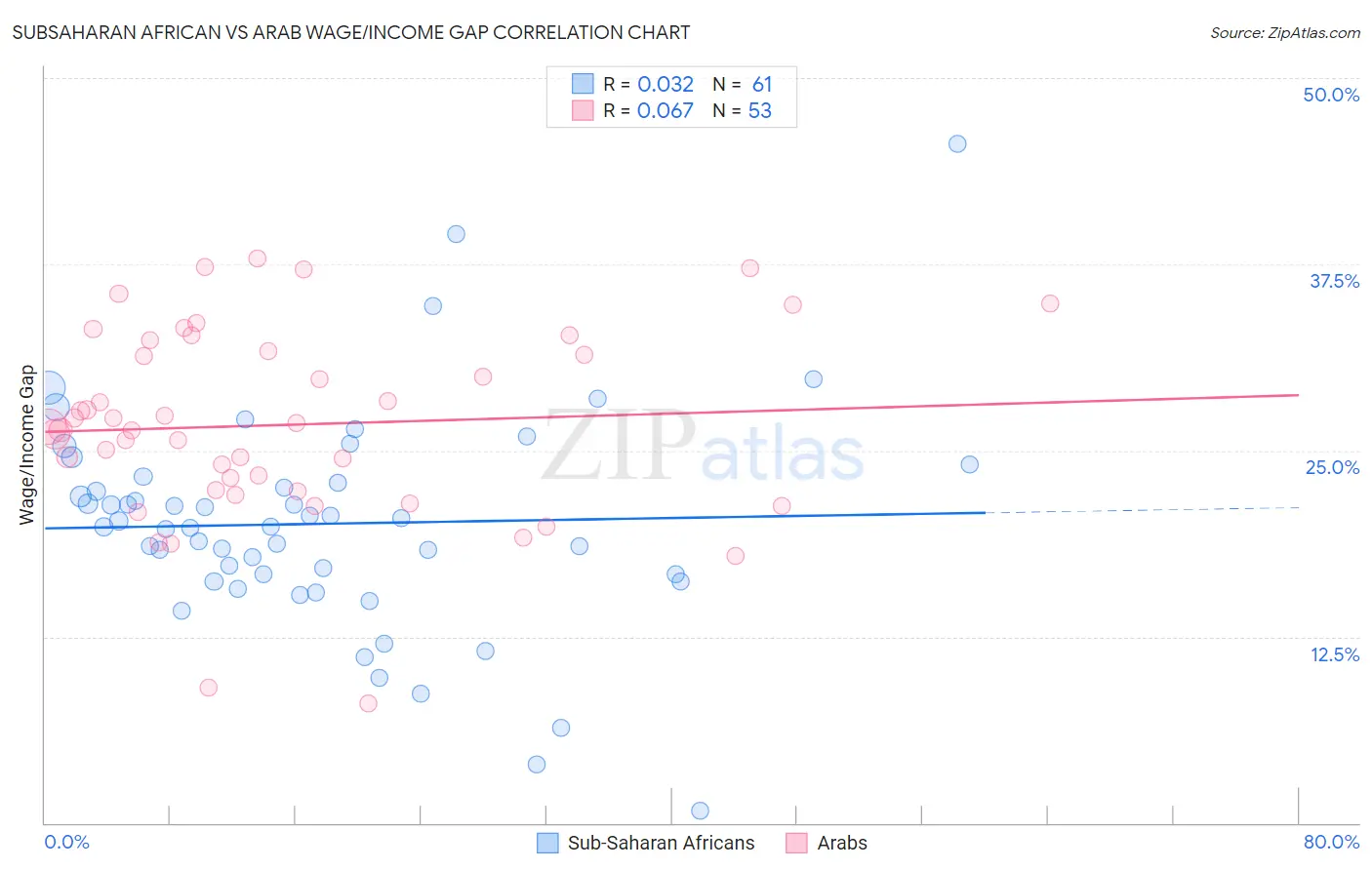Subsaharan African vs Arab Wage/Income Gap
COMPARE
Subsaharan African
Arab
Wage/Income Gap
Wage/Income Gap Comparison
Sub-Saharan Africans
Arabs
22.8%
WAGE/INCOME GAP
99.9/ 100
METRIC RATING
72nd/ 347
METRIC RANK
26.6%
WAGE/INCOME GAP
12.3/ 100
METRIC RATING
210th/ 347
METRIC RANK
Subsaharan African vs Arab Wage/Income Gap Correlation Chart
The statistical analysis conducted on geographies consisting of 507,315,173 people shows no correlation between the proportion of Sub-Saharan Africans and wage/income gap percentage in the United States with a correlation coefficient (R) of 0.032 and weighted average of 22.8%. Similarly, the statistical analysis conducted on geographies consisting of 486,307,173 people shows a slight positive correlation between the proportion of Arabs and wage/income gap percentage in the United States with a correlation coefficient (R) of 0.067 and weighted average of 26.6%, a difference of 16.6%.

Wage/Income Gap Correlation Summary
| Measurement | Subsaharan African | Arab |
| Minimum | 0.79% | 8.0% |
| Maximum | 45.6% | 37.9% |
| Range | 44.8% | 29.9% |
| Mean | 20.1% | 26.7% |
| Median | 19.9% | 26.6% |
| Interquartile 25% (IQ1) | 16.4% | 22.3% |
| Interquartile 75% (IQ3) | 23.0% | 32.0% |
| Interquartile Range (IQR) | 6.6% | 9.7% |
| Standard Deviation (Sample) | 7.4% | 6.5% |
| Standard Deviation (Population) | 7.4% | 6.4% |
Similar Demographics by Wage/Income Gap
Demographics Similar to Sub-Saharan Africans by Wage/Income Gap
In terms of wage/income gap, the demographic groups most similar to Sub-Saharan Africans are Immigrants from Eastern Africa (22.8%, a difference of 0.030%), Immigrants from Burma/Myanmar (22.8%, a difference of 0.11%), Immigrants from El Salvador (22.8%, a difference of 0.15%), Immigrants from Uzbekistan (22.7%, a difference of 0.31%), and Fijian (22.9%, a difference of 0.39%).
| Demographics | Rating | Rank | Wage/Income Gap |
| Guatemalans | 99.9 /100 | #65 | Exceptional 22.6% |
| Central American Indians | 99.9 /100 | #66 | Exceptional 22.7% |
| Menominee | 99.9 /100 | #67 | Exceptional 22.7% |
| Immigrants | Nigeria | 99.9 /100 | #68 | Exceptional 22.7% |
| Indonesians | 99.9 /100 | #69 | Exceptional 22.7% |
| Immigrants | Uzbekistan | 99.9 /100 | #70 | Exceptional 22.7% |
| Immigrants | El Salvador | 99.9 /100 | #71 | Exceptional 22.8% |
| Sub-Saharan Africans | 99.9 /100 | #72 | Exceptional 22.8% |
| Immigrants | Eastern Africa | 99.9 /100 | #73 | Exceptional 22.8% |
| Immigrants | Burma/Myanmar | 99.9 /100 | #74 | Exceptional 22.8% |
| Fijians | 99.9 /100 | #75 | Exceptional 22.9% |
| Ecuadorians | 99.9 /100 | #76 | Exceptional 22.9% |
| Africans | 99.9 /100 | #77 | Exceptional 22.9% |
| Nigerians | 99.9 /100 | #78 | Exceptional 23.0% |
| Immigrants | Nicaragua | 99.9 /100 | #79 | Exceptional 23.0% |
Demographics Similar to Arabs by Wage/Income Gap
In terms of wage/income gap, the demographic groups most similar to Arabs are Immigrants from Kuwait (26.6%, a difference of 0.040%), Egyptian (26.6%, a difference of 0.060%), Mongolian (26.6%, a difference of 0.13%), Iraqi (26.6%, a difference of 0.16%), and Immigrants from Iraq (26.7%, a difference of 0.31%).
| Demographics | Rating | Rank | Wage/Income Gap |
| Immigrants | Eastern Europe | 19.2 /100 | #203 | Poor 26.4% |
| Immigrants | Russia | 19.0 /100 | #204 | Poor 26.4% |
| Immigrants | Southern Europe | 17.3 /100 | #205 | Poor 26.4% |
| Indians (Asian) | 16.5 /100 | #206 | Poor 26.4% |
| Immigrants | Italy | 15.8 /100 | #207 | Poor 26.5% |
| Egyptians | 12.7 /100 | #208 | Poor 26.6% |
| Immigrants | Kuwait | 12.6 /100 | #209 | Poor 26.6% |
| Arabs | 12.3 /100 | #210 | Poor 26.6% |
| Mongolians | 11.4 /100 | #211 | Poor 26.6% |
| Iraqis | 11.2 /100 | #212 | Poor 26.6% |
| Immigrants | Iraq | 10.3 /100 | #213 | Poor 26.7% |
| Immigrants | China | 10.3 /100 | #214 | Poor 26.7% |
| Yugoslavians | 9.7 /100 | #215 | Tragic 26.7% |
| Immigrants | Portugal | 9.5 /100 | #216 | Tragic 26.7% |
| Brazilians | 9.2 /100 | #217 | Tragic 26.7% |